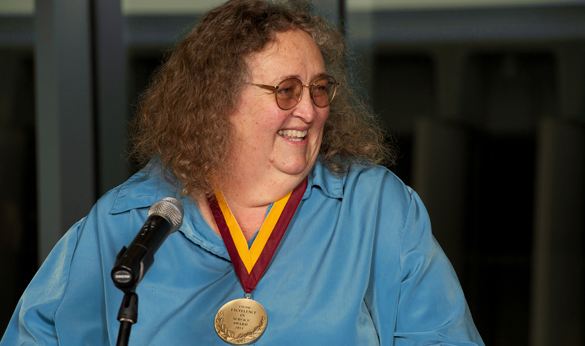While recalling her experiences of growing up in rural environments across the United States, Cathy Jacobs says that her career as an educator was inspired by a childhood spent outdoors.
“I’ve been a naturalist since I could remember,” she says. “I was always catching snakes and wading in ponds, catching tadpoles. When I was a kid, I used to watch the salmon spawn in the riffles of the Sacramento River. You used to see all these dorsal fins in the river at night, and I remember watching this enormous sturgeon – it must have been about six or seven feet long – come up to the surface and go back under.”

Jacobs, who has won the Excellence in Service Award at California State University, Dominguez Hills for a second time (2007 was the first), notes that many of these memories are in danger of becoming just that.
“I’ve watched bits and pieces of the natural world that I love disappear with development and the crush of humanity,” says Jacobs, a lecturer in interdisciplinary studies and biology. “That has gotten me really upset and passionate about teaching about the loss of biodiversity. So many people are unaware that we are seeing one of the largest mass extinction events that have ever occurred. We’re losing species at a rate comparable to what happened at the Permian (Period), 251 million years ago. More than 95 percent of all species in shallow marine habitats were extinct, and more than three-quarters of species on land were extinct. And that is happening right now.”
Jacobs says that teaching interdisciplinary studies comes naturally to her because she has always been “a ‘big-picture’ kind of person.
“Interdisciplinary studies shows the interconnections between the things that students are interested in,” she says, “One of my favorite classes to teach is one on epidemics, where I talk about not only the biology of epidemics, but their social impact, works of art and literature that have come out of [them], and their effect on history. It’s nice to be able to put things into a larger perspective.”
Jacobs says that since her days as a teacher’s assistant while a graduate student at University of California, Los Angeles, she has enjoyed the challenge of getting biology students, particularly non-majors, to think that the topic is “cool.”
“I discovered I was a ham, that I actually had a gift for it,” she says. “I give them lots of examples to tie it to the real world and show that it’s not just some abstract thing that I’m interested in, but that it has some real applications. To get [students] engaged and show them that what they’re learning is important to them on some level is really where I come from as a teacher.”
Jacobs extends her talents and energies to improving the outlook of her colleagues as well. She is currently leading a university committee focused on learning outcomes assessments, both for the use of departments across campus and in anticipation of an upcoming interim accreditation report to the Western Association of Schools and Colleges (WASC).
“My goal has been to make outcomes assessment useful in terms of finding data that will allow us to make decisions about curriculum,” Jacobs says.
“One of the most valuable things a department can do is to create a coherent vision of what it is our students should learn,” says Jacobs. “My job is not to tell the faculty what they should be teaching their students, but it’s for me to help with the process and make it sustainable so they can build on it and make programs better.”
Her research interests include the evolution and organization of animal societies, with particular emphasis on the selective pressures involved in the evolution of mating strategies. Among her numerous contributions to the university beyond teaching, she has been a guest instructor for the Osher Lifelong Learning Institute (OLLI) in the College of Extended and International Education, has presented lectures via two-way television for students at Dominguez High School in Compton, and served in review sessions for the Graduate Writing Exam (GWE).
Jacobs earned her bachelor’s degree in zoology at the University of California, Davis and her master’s and doctorate degrees in biology at UCLA. Before arriving at CSU Dominguez Hills in 1998, she taught briefly at West Los Angeles College and at UCLA from 1984 to 1990. She participated in the Oxford Round Table in 2007 and 2010 and is a member of the American Ornithological Society, the Animal Behavior Society, Sigma Xi, and the American Association for the Advancement of Science.
Despite involvement in activist organizations that work to preserve the natural world, “just teaching” is at the center of her efforts.
“I figure that the greatest thing we can do is increase knowledge,” she says. “People will fight to defend the things that they love, and they love the things they know about. If you can teach them about it, you can get them to care.”